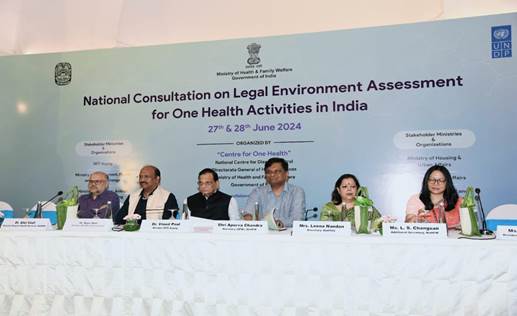“India is ahead of several countries in drafting the legal framework to support and strengthen the implementation of the One Health initiative. This represents India’s advanced thought process and leadership, and showcases our vision in this area. A national consultation with multi partners and stakeholders is not only important but very timely. COVID 19 has forced us to re-focus our attention on the importance of zoonotic diseases and the intricate linkages between the human, animal and plan eco-systems.” This was stated by Dr. Vinod Paul, Member (Health), NITI Aayog as he inaugurated a two-day National Consultation on Legal Environment Assessment for “One Health” initiative, here today.
Shri Apurva Chandra, Secretary, Ministry of Health & Family Welfare (MoHFW), Ms. Leena Nandan, Secretary, Ministry of Environment, Forest and Climate Change (MoEFCC), and Shri Rajiv Mani, Secretary, Ministry of Law & Justice were also present.

Dr. Vinod Paul stated that the issues of critical health challenges posed by zoonoses, antimicrobial resistance (AMR), food safety, and climate change are interconnected and require a comprehensive, multi-sectoral approach to breaking down the silos between human health, animal health, and environmental sectors. He added that India has taken the lead in ensuring One Health goals that resonate with the Prime Minister’s vision of “One Earth, One Health” and “we are pushing frontiers for not just our nation but for the world”. Dr Paul said that in lined with the need of alignment of various frameworks, India has taken up framing of National Action Plan (NAP), 2.0 for addressing the issues raised due to Antimicrobial resistance (AMR), had conceptualised the One Health Mission, and working on the broader issues of climate change. He further stressed that to ensure the achievement of One Health goals, state engagement, alignment of Indian laws with international laws, and cross-sectoral response are required.
Highlighting that more than 75% of the diseases that affect humans are zoonotic diseases, Shri Apurva Chandra stated that the Ministry of Health & Family Welfare is committed to preventing and managing risks at the human-animal-plant interface through the One Health approach. “‘One Health’ is a multi-sector and multi-stakeholder initiative; collective and coordinated action needed for its success at the ground level”, he stated. He noted that under PM-ABHIM, states are being strengthened in surveillance, prevention and management of zoonotic and other diseases. He reiterated that India’s current legislative framework, with its separate laws for human health, animal health, and environmental protection, has some gaps and overlaps due to sectoral priorities. He also highlighted the importance of support from the line ministries and the States in implementing One Health goals.
In her address, Ms. Leena Nandan, Secretary (MoEFCC), stressed on the need for a commonality of approach among different ministries in ensuring the achievement of One Health goals. She assured that the Environment Ministry is committed to making necessary provisions under the existing Acts of wildlife and environment to ensure the health of human beings and the conservation and preservation of wild animals. She stated that the One Health initiative has been one of the main topics of discussion during the G20 under the One Earth, One Family, One Future umbrella. She emphasised on the need for capacity building of the on-ground functionaries and communities for successful implementation of the One Health initiative.
Shri Rajiv Mani re-iterated the support from the Ministry of Law and Justice to assist the stakeholders in making required amendments or changes in the existing laws and policy frameworks to align with the One Health principle and mandates of the country for the protection of the health of all species including animals and the climate.

The Centre for One Health, National Centre for Disease Control, and Directorate General of Health Services are organizing this two-day multi-stakeholder National Consultation on Legal Environment Assessment for One Health activities in India on 27-28th June 2024 at New Delhi. The consultation is being organized to brainstorm on the legal and policy perspectives on the core domains of One Health i.e., IHR, Biosafety & Security, Zoonoses, Anti-Microbial resistance, food-borne illness, and Climate change and Health, etc. The ‘One Health’ approach, which integrates the health of people, animals and the environment, is crucial for addressing complex health challenges such as zoonotic diseases, antimicrobial resistance, and food safety.
The National Consultation for Legal Environment Assessment for One Health Activities aims to:
1) Assess the current legal framework: Identify strengths, gaps, and overlaps in the existing laws and regulations that impact One Health activities.
2) Foster multi-sectoral dialogue: Bring together stakeholders from government, academia, industry, and civil society to discuss legal challenges and opportunities.
3) Develop actionable recommendations: Formulate concrete proposals to enhance the legal environment, ensuring it is conducive to the integrated One Health approach.
4) Promote inter-sectoral collaboration: Strengthen partnerships among sectors responsible for human, animal, and environmental health.
Prof. (Dr.) Atul Goel, DGHS & Director, NCDC, MoHFW, Ms. L.S. Changsan, Additional Secretary, Ms. Sarita Chauhan, Joint Secretary, Ministry of Fisheries, Animal Husbandry and Dairying, Ms. Isabel Tschan, Resident Representative A.I. UNDP, Dr. Simmi Tiwari, nodal for One Health, NCDC and subject experts were also present on the occasion.

Comments are closed.